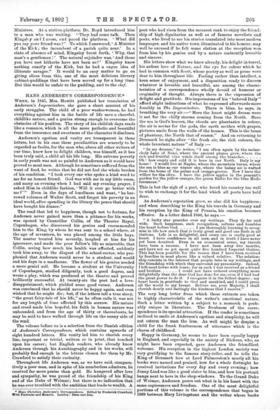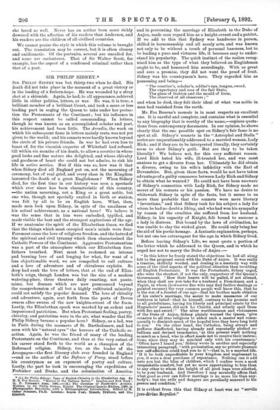HANS ANDERSEN'S CORRESPONDENCE.*
WHEN, in 1845, Mrs. Howitt published her translation of Andersen's Improvisatore, she gave a short account of his early struggles. The child of a poor washerwoman, he had everything against him in the battle of life save a cheerful, childlike nature, and a genius strong enough to overcome the obstacles of his position. The story of his childish days reads like a romance, which is all the more pathetic and beautiful from the innocence and sweetness of the character it discloses.
Andersen's egotism and vanity are transparent in these letters, but in his case these peculiarities are scarcely to be regarded as faults, for the man who, above all other writers of our time, knew how to delight children, was himself, as it has been truly said, a child all his life long. His extreme poverty in early youth was not so painful to Andersen as it would have proved to most men. Although he sometimes suffered from the want of food, he writes that he did not feel the whole burden of his condition. "I took every one who spoke a kind word to me for an honest friend. God was with me in my little room,
and many an evening when I had said my evening prayer, I asked Him in childlike fashion, ' Will it ever go better with me ?" Even in the days of loneliness and want, " he bor- rowed volumes of Walter Scott, and forgot his poverty in an ideal world, after spending in the library the pence that should have bought his dinner."
The road that led to happiness, though not to fortune, for Andersen never gained more than a pittance for his works, was opened by Councillor Collin, of the Theatre Royal, Copenhagen, who discovered his genius and recommended him to the King, by whom he was sent to a school where, at the age of seventeen, he was placed among the little boys. The master treated him severely, laughed at him for his ignorance, and made the poor fellow's life so miserable, that Collin, seeing how much his health was affected, suddenly took him away, to the disgust of the school-rector, who pro- phesied that Andersen would never be a student; and would end his days in a madhouse. The flower of his genius needed a more genial soil. He became a student at the University of Copenhagen, studied diligently, took a good degree, and wrote a play, which was produced at the theatre and proved brilliantly successfuL At twenty-six the poet had a love- disappointment, which yielded some good verses. Andersen was convinced that he should never be happy again, and even wished that he might die; but, if the letters tell a true story, "the great fairy-tale of his life," as he often calls it, was not for any length of time affected by this sorrow. His nature and creed made him hopeful, his faith in human nature was unbounded, and from the age of thirty or thereabouts, he may be said to have walked through life on the sunny side of the road.
The volume before ns is a selection from the Danish edition of Andersen's Correspondence, which contains upwards of eight hundred letters. His vanity led him to cherish every line, important or trivial, written or in print, that touched upon his career; but English readers, who already know Andersen through his Autobiography and in his works, will probably find enough in the letters chosen for them by Mr. Crawford to satisfy their curiosity.
Throughout life Andersen was, as we have said, compara- tively a poor man, and in spite of his numberless admirers, he received far more praise than gold. He hungered after love and sympathy, he was proud of the friendship of his King and of the Duke of Weimar; but there is no indication that he was ever troubled with the ambition that leads to wealth. A
• Hans Christian Andersen's Cornspondenee. Edited by Frederick Crawford. With Portraits and Memoir. London : Dean and Son.
poet who had risen from the meanest rank to enjoy the friend- ship of high dignitaries as well as of famous novelists and poets, who lived to see his stories translated into most modern languages, and his native town illuminated in his honour, may well be excused if he felt some elation at the reception won from him by his genius and by a nature eminently loveable and sincere.
His letters show what we knew already, his delight in travel, his ardent love of Nature, and the eye for colour which he had in common with Scott, whose poetry as well as prose were dear to him throughout life. Feeling rather than intellect, a keen sense of enjoyment, and a disposition ready to discern whatever is loveable and beautiful, are among the charac- teristics of a correspondence wholly devoid of humour or originality of thought. Always there is the expression of delight and gratitude. His impressions of his " beloved Italy " afford slight indications of what he expressed afterwards more
forcibly in The Improvisatore. There is bliss, he says, in breathing the very air :—" Here the heart might dream were it not for the chilly storms coming from the North. Here
the sea is God's heaven, the clouds are phantasies in colour, the air is nectar for the gods, the earth seethes with grapes, pictures smile from the walls of the houses. This is the home of phantasy, the North that of reason." And on returning to Denmark he sighs after " the fresh air, the rich colours, the whole luxuriant nature" of Italy :—
" In my dreams," he writes, "I am often again by the melan- choly Lake of Nemi, where the ancient planes grow, where the rich and fruitful vine winds itself among the branches
Oh ! how empty and cold it is here in our North. Italy is my home ! I would live at Naples, where the mountain burns, where the sea is blue as our winter sky, where the balmy air is wafted from the home of the palms and orange-groves. Now I have the willow for the olive. I have the yellow apples in the peasant's garden for the yellow oranges, the green Baltic for the blue Medi- terranean."
This is but the sigh of a poet, who loved his country too well to wish to exchange it for the land which all poets have held dear.
As Andersen's reputation grew, so also did his happiness ; and when describing to the King his travels in Germany and his reception by the King of Prussia, his emotion becomes effusive. In a letter dated 1846, he says :-
" A. lucky star presides over my writings. They fly far and wide. Such happiness, such recognition, softens and humbles the heart before God. . . . . . I am thoroughly learning to recog- nise in life how much that is truly great and good one finds in all stations. Life is so delightful, and every one is really good at heart. I have confidence in all men, and in truth I have never yet been deceived. Even in an economical sense, my travels have been a success. I have now been away five months, and have not as yet spent quite five hundred Imperial thalers. This has been possible for the reason that I have been received by families in most places like a valued relative. The relation- ship consists in the interest that people take in my writings, and the friendship with which they surround my personality. Indeed, I left most towns with tears ; for in each I was received as a friend.
and brother I could not have ordered everything more delightfully than the dear God has done for me, even if I had had the great power to do it. I recognise it in the fullest degree ; my heart beats in gratitude to God and mankind, and I could press all the world to my breast. Believe me, your Majesty, I shall cherish dearly and lastingly the kindness that I receive."
The very long letter from which these extracts are taken is highly characteristic of the writer's emotional nature. Such a letter written by a subject to a monarch is prob- ably unique in literature. The freshness of the corre-
spondence is its special attraction. If the reader is sometimes inclined to smile at Andersen's egotism and simplicity, he will
not esteem the man the less. As well might he despise a. child for the frank fearlessness of utterance which is the charm of childhood.
Happy in Germany, he seems to have been equally happy in England, and especially in the society of Dickens, who, as
might have been expected, gave Andersen the friendliest welcome. His reception in the highest London society was very gratifying to the famous story-teller, and he tells the King of Denmark how at Lord Palmerston's nearly all his books were named and praised, how for a whole fortnight he received invitations for every day and every evening ; how Jenny Lind was like a good sister to him, and how hie portrait hangs next to hers in the shop-windows. To the Grand Duke of Weimar, Andersen pours out what is in his heart with the same copiousness and freedom. One of the most delightful portions of this volume is the correspondence that began in 1869 between Mary Livingstone and the writer whose books she loved so well. Never has an author been more richly -dowered with the affection of his readers than Andersen, and his readers are the children of all civilised countries.
We cannot praise the style in which this volume is brought oat. The translation may be correct, but it is often clumsy and unidiomatic. Of the portraits, several are uncalled for, and some are caricatures. That of Sir Walter Scott, for example, has the aspect of a confirmed criminal rather than that of a poet.







































 Previous page
Previous page